Martin Edwards's Blog, page 35
October 20, 2023
Forgotten Book - The Westwood Mystery
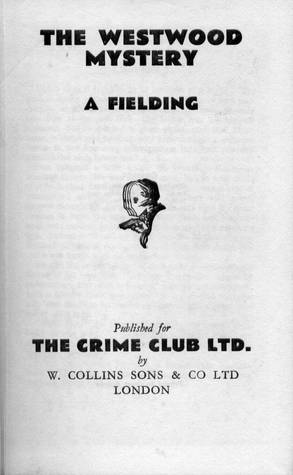
A. Fielding was a mystery writer who was very, very mysterious. He (or she) wrote more than twenty detective novels, published by Collins (who didn't bother with minor writers) between 1924 and 1937 yet nobody seems to know who he (or she) was. Even the ace researcher John Herrington, who has investigated Fielding extensively, ran into a series of dead ends. The consensus seems to be that Fielding was a woman, although on the evidence of the 1932 novel The Westwood Mystery, I wouldn't be startled to learn the author was in fact a man.
I haven't bothered with Fielding until now, because I had a feeling that the books were of a second-rate humdrum type. However, I came into possession of Anthony Berkeley's own copy of this book, and thought I must give it a go. This novel definitely has a number of pleasing ingredients. The concept for the plot is pretty good and there are a few nice touches of wit. Overall, though, I found the story frustrating because I didn't feel the ingredients were mixed with sufficient skill.
There are two strands of story. The first involves a barrister, Sir Adam Youdale, who is skilled at defending people who are apparently guilty. The second involves a dodgy businessman called Fox, who specialises in exploiting gullible women for financial gain. Youdale is found murdered at his home, Westwood, but for some time Fox drops out of our sight as Inspector Pointer pursues his inquiries.
Berkeley pencilled some notes in the book and it's clear that he had reservations similar to mine. 'Rather heavy going in the middle', for instance, is spot on. I'm rather baffled as to why the book is so disjointed, because it does seem to me that Fielding could have improved this story by structuring it differently. Possibly it was written in too much haste. Yet there is enough merit in the writing for me to be interested in reading more of Fielding's work.
October 18, 2023
The Long Shadow - ITV review
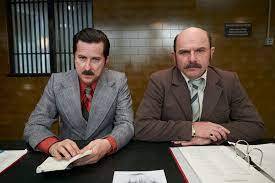
I have a special interest in this case because I lived in Leeds at the height of the crisis over the murders. They overshadowed everything, and affected everyone. An old schoolfriend of mine, one of the gentlest people you could meet, who had moved to the area, told me he was interrogated by the police - not once ,but twice, which must have been frightening. This was because he was gay and he'd been visiting gay clubs and bars in Leeds, which were in the 'red light' district being targeted for intensive surveillance. There's no doubt that the police worked very hard at trying to solve the crimes. But their approach was flawed in several respects and as a result, although Sutcliffe was interviewed several times, he slipped through the net. The Long Shadow highlights this mercilessly but, I think, fairly.
The biggest mistake was to believe that the hoax letter and tape purporting to be from the Ripper were genuine. An advertising agency for which my firm acted gave the police a vast amount of free advertising to make sure everyone heard the tape. Sadly, it helped Sutcliffe to continue with his crimes. The hoaxer was discovered many years later thanks to DNA testing. He was a pathetic alcoholic called John Humble, and he went to prison and subsequently died. What he did was truly appalling. Humble, not the misguided detectives, was in effect Sutcliffe's accessory.
Any show that dramatises real life needs to be treated with caution. But from my experience, I'd say The Long Shadow gets most things right. If anything it underplays the fear that everyone felt. I remember getting off the bus home one night, and a middle-aged woman I didn't know begged me to walk her home because she was afraid of the Ripper. For a moment, she wondered if I was to be trusted (though Sutcliffe's crimes began when I was still at school) and I could imagine how many innocent people, like my gay friend, must be coming under suspicion. I became friendly with her and saw how deeply affected she was by the murders. On another occasion, I arrived back in Leeds after a train trip to see my girlfriend to find that a bus strike had begun. I couldn't afford a taxi, so I found myself walking home through the dark streets of Harehills and Chapeltown, wondering if the Ripper was anywhere near. It was eerie and unsettling and I'll never forget it. The sheer uncertainty about what might happen wore down everyone in the city, and indeed much further afield.
Sutcliffe and his enigmatic wife Sonia, who is still alive, hardly feature in the TV series. There is proper and respectful focus on the victims and the senior police officers are key to the storyline. Toby Jones is as good as ever as the honourable Dennis Hoban, while David Morrissey tackles the challenging role of Norman Oldfield with his customary brilliance. It is a really nuanced performance, because Oldfield was not a bad man, even if he did make serious mistakes. Michael McElhatton is excellent as Ronald Gregory, the chief constable who was again well-intentioned, but didn't cover himself in glory, to say the least. I wonder what the families of the police officers made of the show - this hasn't been the subject of as much discussion as the impact on the families of the murder victims. Those victims are, as far as I can judge, very well portrayed, with Katherine Kelly outstanding as Emily Jackson.
It's not easy to handle material like this sensitively and yet make a series compelling viewing. But I think The Long Shadow succeeds.
October 16, 2023
Berwick Literary Festival

I enjoy taking part in literary festivals. Each one has its own personality and special form of appeal, and that was certainly true of the Berwick Literary Festival, which was held this past weekend. I was invited last year, but wasn't able to attend, so I was very glad to be able to make it this year. Glorious weather was a real bonus for such a long trip to a very interesting part of the world.
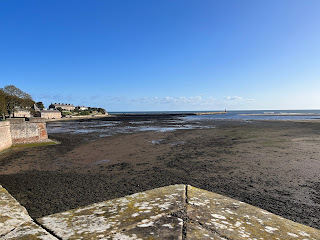


I was interviewed by Lindsay Allason-Jones, an eminent archaeologist with a taste for classic crime fiction and although we'd never met before, I felt the conversational approach worked really well and made for a truly enjoyable experience. Lindsay kindly invited us to her home for a cup of tea and told a fascinating story about a mysterious shelter in her garden which, she discovered, was used by a former resident to intercept signals during the war, which he then passed via London to Bletchley Park. An extraordinary bit of domestic history.


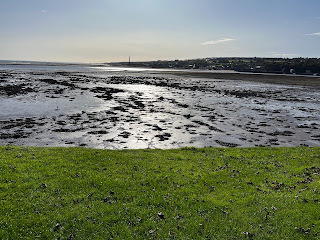
The weather meant that it was possible to see Berwick at its very best. I've visited briefly before, but this time we were able to get a proper feel for the town's character and incident-packed history. Needless to say, I'm now wondering about setting a short story there. The local element may kick-start a story idea that I've been wrestling with for several weeks without any progress!


We were fortune to be given wonderful hospitality by Sophie and Angus Hamilton in their marvellous home, perched above the River Tweed. Spending time with them really gave the trip an added element of memorability. En route, I called in at Cogito Books in Hexham, a splendid shop. And on the long return journey there was time to explore Cragside, an impressive National Trust property. A great trip.
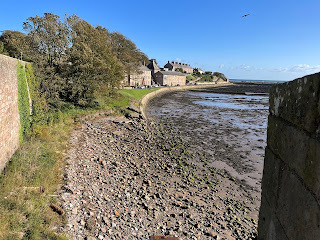

October 13, 2023
Forgotten Book - The Four False Weapons
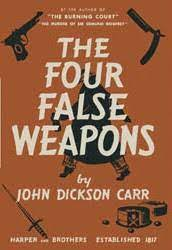
Henri Bencolin, the Great Detective who appeared in John Dickson Carr's first four novels returns in The Four False Weapons, a story written a few years later and offering a modified presentation of the character. I gather from Doug Greene's biography of Carr that he felt the detective was, in effect, too dark, and here he's retired and in lighter and less devilish form than in the earlier books.
The story begins, however, with Richard Curtis, a young partner in a London law firm who dreams of adventure being summoned to France to assist a client who is caught up in a very difficult situation. Ralph Douglas wants to marry Magda Toller, but his former mistress, Rose Klonec, has been found murdered in the villa where he had 'installed' her. Soon Richard is getting all the adventure he could ever have wished for. Such assignments never came my way during my legal career, I have to say!
Rose's body has been surrounded by weapons, but it's not clear how, let alone why, she came to die. I did wonder if this scenario was a distant inspiration for Agatha Christie's The Clocks, which name-checks Carr, whose storyline does actually feature a clock. Christie was a friend and admirer of Carr and inscribed at least one book to him, which is still in the family's possession.
Even more so than The Clocks, I'm afraid the brilliance of the set-up is not maintained throughout the story and I agree with Doug Greene that it's a minor work. I think the changes to Bencolin's character are not for the better while Curtis is simply a substitute for Jeff Marle in the earlier books. The plot and indeed the motive disappointed me. Yet there are occasional flashes of Carr's customary zest which make the book worth reading as long as you're not hoping for one of his masterpieces.
Forgotten Book - At Last, Mr Tolliver

At Last, Mr Tolliver by William Wiegand won the Mary Roberts Rinehart Prize in 1950 (ahead of books by Fay Grissom Stanley, Thaddeus O'Finn, and Maude Parker, none of whom, I must admit, I've ever heard of). It's a book that achieved widespread acclaim in its day, and remarkably the author - a student at Michigan University - was only 21 years old. Impressive!
William Wiegand went on to have an illustrious career in academe, teaching creative writing in California. However, despite making such a successful start as a novelist, he only published one more crime novel, which appeared ten years after his debut, plus a few other books. I've read some of his correspondence - with fellow academic and mystery expert Donald Yates, to whom my copy is inscribed by Wiegand - and it's not entirely clear to me why he didn't pursue a career in fiction with more vigour. Perhaps he didn't find it financially rewarding, despite the advantage of a prize-winning start at a young age. His correspondence with Yates, although sporadic, spanned thirty years and he lived until 2016.
So what of the book itself? It's a kind of locked room mystery, but as the dust jacket blurb of the first edition says, 'The intricate solution...is only one of the suspense elements'. The eponymous Tolliver is a tenant in a boarding house and is confronted by the mysterious death of a fellow tenant. It becomes clear that Tolliver's own background gives him criminal connections and he investigates the puzzle for his own purposes.
I think it's fair to say that this is a Marmite sort of book. Readers seem either to love it a lot (Nick Fuller, a good judge, is among them) or find it rather on the pretentious side. To my surprise and regret, I'm afraid I found myself in the latter camp, partly because I never quite warmed either to Tolliver or the situation with which he is confronted. Maybe I was in the wrong mood to enjoy it. It is certainly 'different', and I can understand why it earned critical praise. So maybe I'll revisit it another time.
Forgotten Book - A Bone and a Hank of Hair
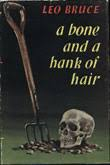
My enthusiasm for the work of Leo Bruce has increased steadily over the years. At first, I was more interested in his early books, featuring Sergeant Beef, but the advocacy of Barry Pike, a very good judge of classic detective fiction, led me to sample the Carolus Deene stories, and that series does contain several gems. I'd put A Bone and a Hank of Hair (1961) very high on the list, possibly right at the top.
This is an unusual mystery, with a genuinely ingenious plot. Like all the Carolus Deene books I've read so far, the focus is on dialogue - Bruce isn't a man for detailed description, although I did learn that Carolus is, like Lord Peter Wimsey and Dr Gideon Fell, a Balliol man. This story is set over the Christmas holidays, although the festive season plays a negligible part in events as Carolus seeks out the truth about an enigmatic and disreputable character called Brigham Rathbone.
Carolus is consulted by a woman called Ada Chalk, who believes Rathbone has murdered her cousin and cheated her children out of an inheritance. Carolus is persuaded to investigate what has happened and soon finds that Rathbone has been involved in a series of house moves - and that each time, he appears to have been accompanied by a different wife. Is Rathbone a latter day George Joseph Smith?
There are several very witty scenes among the countless interviews that Carolus conducts. I especially enjoyed two landlords, one in Cornwall who despises local artists, and another who is obsessed with the old school tie and reminiscences of war-time. Despite a few darkish touches, there's a lot of fun to be had with this story, and the puzzle element is wonderfully tricky.
October 12, 2023
Forgotten Book - Someone from the Past
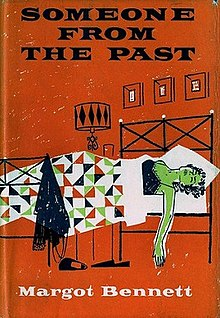
Margot Bennett published Someone from the Past in 1958. It was her sixth crime novel and proved to be her last. It won the CWA Gold Dagger (to use the familiar term for the award for best crime novel of the year) and yet, remarkably, she gave up on the genre after that, apart from writing a few television episodes of crime fiction, notably for Maigret. By 1968, she was finished as a writer, though she was still only in her mid-fifties and lived until 1980.
All those six novels are distinctive. This one is narrated by a young woman called Nancy Graham and I sense that there are elements of self-portraiture (in a heightened sense) in her portrayal. Nancy is rash and often dishonest, but she has redeeming qualities and is an aspiring novelist. She is also, like Bennett, very witty. The phrase-making in this book is delightful.
The premise is simple. Nancy's old chum and former room-mate Sarah Lampson has spent years flitting from man to man. She is about to marry someone rich when someone from her past sends a threatening letter. She confides in Nancy, but before anything can be done, Sarah is murdered.
Nancy becomes a prime suspect, which rather serves her right given how stupidly she behaves at times, but we know that the real killer is one of four men whom Sarah betrayed: Donald, Michael, Peter, or Laurence. Suspicion shifts around this quartet before Nancy herself uncovers the truth. The mystery is okay, but for me it's the quality of the writing that makes this story stand out from the crowd.
October 11, 2023
Bouchercon - a great honour for the future and some great memories from the past
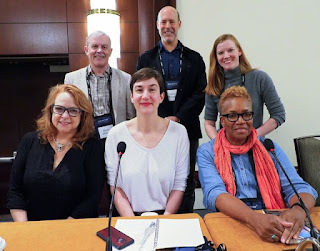
I'm honoured to have been invited to be International Guest of Honour at Bouchercon 2027 in Washington D.C. Of course, I'm extremely grateful to the organisers and it's a privilege to be invited alongside Laura Lippman, George Pelecanos, Shawn Crosby and others. It's a long way in the distance - and we know how much can happen in four years! - but it's definitely something to look forward to.
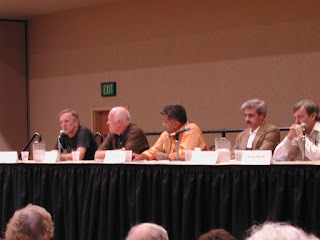
This invitation has also prompted me to reflect on my involvement with Bouchercon, the world's leading mystery convention and to dig out a few photos from over the years. It's an association that dates back more than 30 years. To 1990, in fact, when the convention came to London. At that time, I wasn't a published novelist, but I very much enjoyed meeting a number of leading writers - including Patricia Cornwell, who had just published her own first novel. That was when I also met Geoff Bradley, Tony Medawar, and Maxim Jakubowski for the first time, as a result of participating in the Criminal Mastermind competition.
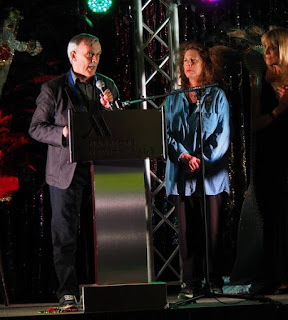
A couple of years later, when I had become a published novelist, I travelled with my wife and infant son to Toronto, another memorable experience (as was the more recent Toronto Bouchercon, with a trip to Niagara Falls among the delights). In 1995, Bouchercon came to Nottingham, the last time it was held in England, and among other things I took part in a dramatised performance about crime fiction along with Stephen Murray and Gillian Linscott - a very rare venture onto the stage. There was also another Mastermind, this time with Ed Hoch and Marv Lachman among the contestants.
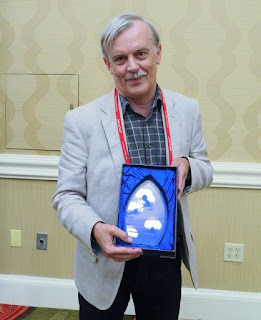
In 2003, I went to the Las Vegas Bouchercon, where I met Ali Karim for the first time and spent some great days touring with the late and much-missed Stuart Pawson and his wife Doreen. In more recent years, I've attended Bouchercons at places such as New Orleans, Dallas, St Petersburg, and San Diego. I've picked up awards on three occasions and I've spent quality time with some lovely people.
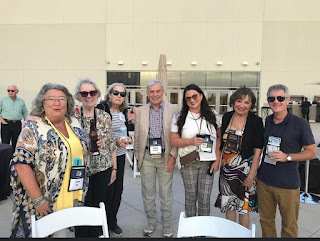
So many good times and I hope for more in the future. One thing is for sure: the youngish enthusiast who attended his first Bouchercon as a fan more than 30 years ago would never have imagined that the day would come when he'd be invited along as a guest of honour. It's hard to believe even now, and I'm truly delighted.
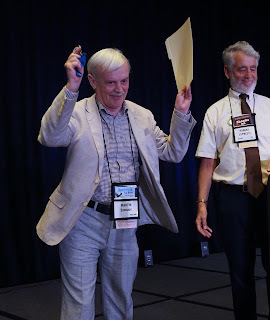
I'm honoured to have been invited to be International Gue...

I'm honoured to have been invited to be International Guest of Honour at Bouchercon 2027 in Washingtnn D.C. Of course, I'm extremely grateful to the organisers and it's a privilege to be invited alongside Laura Lippman, George Pelecanos, Shawn Crosby and others. It's a long way in the distance - and we know how much can happen in four years - but it's definitely something to look forward to.

This invitation has also prompted me to reflect on my involvement with Bouchercon, the world's leading mystery convention and to dig out a few photos from over the years. It's's an association that dates back more than 30 years. To 1990, in fact, when the convention came to London. At that time, I wasn't a published novelist, but I very much enjoyed meeting a number of leading writers - including Patricia Cornwell, who had just published her own first novel. That was when I also met Geoff Bradley, Tony Medawar, and Maxim Jakubowski for the first time, as a result of participating in the Criminal Mastermind competition.

A couple of years later, when I had become a published novelist, I travelled with my wife and infant son to Toronto, another memorable experience (as was the more recent Toronto Bouchercon, with a trip to Niagara Falls among the delights). In 1995, Bouchercon came to Nottingham, the last time it was held in England, and among other things I took part in a dramatised performance about crime fiction along with Stephen Murray and Gillian Linscott - a very rare venture onto the stage. There was also another Mastermind, this time with Ed Hoch and Marv Lachman among the contestants.

In 2003, I went to the Las Vegas Bouchercon, where I met Ali Karim for the first time and spent some great days touring with the late and much-missed Stuart Pawson and his wife Doreen. In more recent years, I've attended Bouchercons at places such as New Orleans, Dallas, St Petersburg, and San Diego. I've picked up awards on three occasions and I've spent quality time with some lovely people.

So many good times and I hope for more in the future. One thing is for sure: the youngish enthusiast who attended his first Bouchercon as a fan more than 30 years ago would never have imagined that the day would come when he'd be invited along as a guest of honour. It's hard to believe even now, and I'm truly delighted.

October 9, 2023
Who Killed Father Christmas? - anthology number 50!
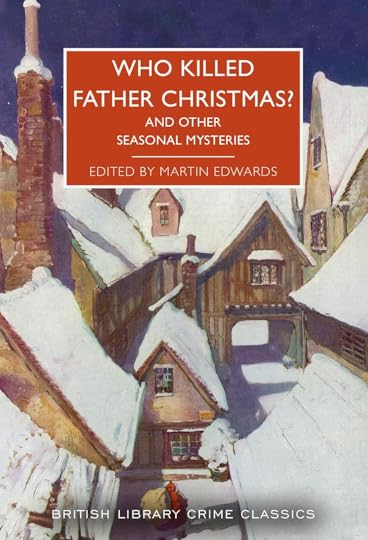
Tomorrow sees the publication of my 50th anthology of short mystery stories, Who Killed Father Christmas? You guessed, it's another seasonal collection in the British Library Crime Classics series and I'm truly delighted to notch up my half-century. (Assuming I've counted correctly, which can't be taken for granted! There has also been, by the way, a collection of non-fiction essays about true crime).I've loved short mystery anthologies since receiving a CWA collection for Christmas back in the late 60s. I never imagined then that I'd edit one myself, let alone so many - my dream at that point was simply to write short stories as well as novels. But having begun with Northern Blood, a book of stories by northern CWA members, one thing led to another. It's been an enormous pleasure to be the first to receive manuscripts of brand new stories from talented authors, famous and not so famous (an experience I'm currently enjoying with two anthos that are currently in the course of compilation) while it's also fun to discover or rediscover tales that fit in with a specific Crime Classics theme.
The majority of the 50 collections have been edited on behalf of either the CWA or the British Library, but there have been some other fun projects along the way, including Ten Year Stretch for CrimeFest and Motives for Murder for the Detection Club, as well as a number of Murder Squad books. Publishers tend to be dubious about anthologies, but they can sell well if correctly marketed. The themed Crime Classics anthologies have been enormously popular, with terrific sales to match glowing reviews, and I'm currently researching two more potential collections for next year.
Who Killed Father Christmas? has a title story written by Patricia Moyes. It's a title I love and although it's been used before, for a Moyes collection under the Crippen & Landru imprint, Doug Greene and Jeff Marks were very happy for me to use it, which I appreciate. There are some lovely stories in this one, and I'm especially pleased with my discovery of a very obscure tale by Glyn Daniel. As ever, there's a mix of well-known authors and those whose reputations have faded. I'm hopeful that plenty of people are going to find that it makes an excellent Christmas present - and I think that anthology number 50 bears comparison with the best of its predecessors.



